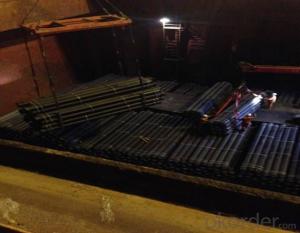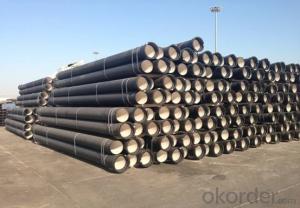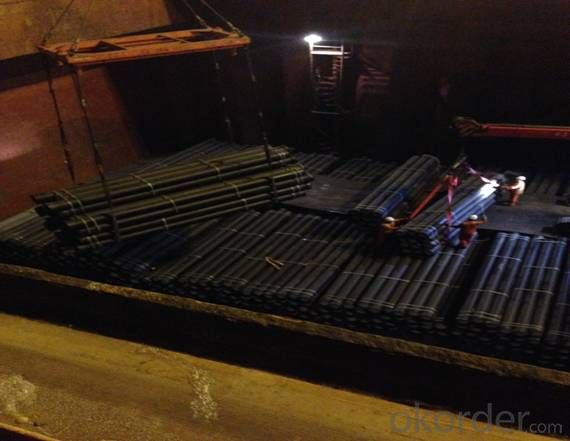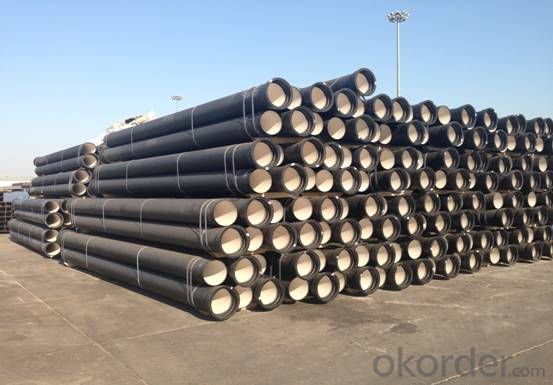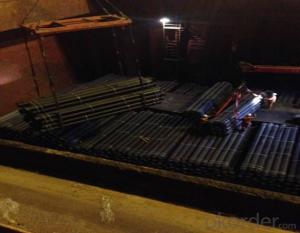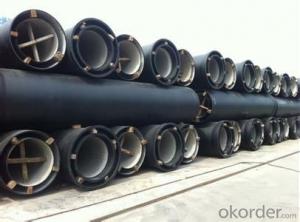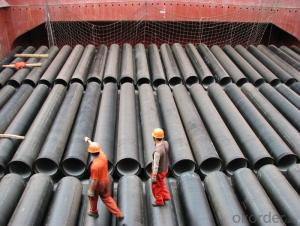DUCTILE IRON PIPE K8 DN1200
- Loading Port:
- China Main Port
- Payment Terms:
- TT OR LC
- Min Order Qty:
- -
- Supply Capability:
- -
OKorder Service Pledge
OKorder Financial Service
You Might Also Like
Ductile Iron Cast Pipe is without any defects compare with tradition casting tech, which has many advantages particularly as follow:
(1) High density. In the "vertical upward casting" process, the melt iron of centre liquid column in center crystallizer is continuously feeding for volume shrinkage caused by condensation tube at outer circumference , which lead to be free of shrinkage porosity.
(2) High purity. When melt iron pouring, the mixed impurities such as gas, dross, sand grain which are lighter than melt iron could be eliminated at furnace mouth, its impossible to enter into the crystallizer through the channel, so the melt iron into the crystallizer is very pure.
(3) Strength with toughness. The cooling speed provided by continuous crystallizer is 30 times than sand casting and 5 times than centrifugal casting, and doesn't produce white iron, the eutectic cell volume of continuous cast iron is one eighth to one tenth compare with traditional cast iron. The density of graphite nodule in ductile iron can reach 300-700 pcs/mm2. Therefore, all reason above improve the strength and toughness of continuous cast iron.
(4) Free machining. The high speed cooling make the hardening phase (such as boride, steadite) not appear like reticular, massive or thick, but diffuse like fish bone and pane in shape, moreover, there are tiny graphite flakes inlaid hardening phase. It's free machining in BrinellHardness the range of 250-300HB. However, the Brinell Hardness of 250 is top limit to common metal materials.
(5) Uniform composition of tube wall. The convection mixing of liquid column caused by marching type drawing in crystallizer make the composition of tube wall well-distributed, and concentration gradient very little.
(6) High productivity. To the wall thickness of tube under 10mm, the speed of continuous casting is 1 meter/min, to the wall thickness of tube under 20mm, the speed of continuous casting is 0.5 meter/min, which is high efficiency that centrifugal or other casting tech couldn't reach.
- Q: How does ductile iron pipe perform in high-pressure gas applications?
- Due to its unique characteristics and properties, ductile iron pipe is an outstanding option for high-pressure gas applications. Firstly, its high tensile strength enables it to withstand the immense pressure exerted by gas flowing through the pipeline, ensuring leakage or rupture-free containment. Additionally, ductile iron pipe exhibits remarkable resistance to corrosion, making it ideal for gas applications that may encounter moisture, chemicals, or other corrosive substances. This corrosion resistance guarantees the pipe's longevity and minimizes the risk of damage or failure caused by corrosion. Another advantage of ductile iron pipe in high-pressure gas applications is its capability to handle thermal expansion and contraction. As gas is transported under high pressures, temperature fluctuations occur, resulting in pipeline expansion and contraction. However, ductile iron pipe's flexibility allows it to adapt to these changes without compromising its performance or structural integrity. Furthermore, ductile iron pipe's smooth interior surface reduces friction losses and pressure drops, resulting in efficient gas flow. This smoothness also reduces the likelihood of gas impurities or debris becoming trapped, potentially leading to blockages or flow disruptions. In conclusion, when it comes to high-pressure gas applications, ductile iron pipe is a dependable and durable choice. Its high tensile strength, corrosion resistance, ability to handle thermal expansion, and smooth interior surface all contribute to its exceptional performance in demanding conditions.
- Q: What are the common pressure ratings for ductile iron pipes?
- The common pressure ratings for ductile iron pipes typically range from 150 psi (pounds per square inch) to 350 psi.
- Q: Can ductile iron pipe be used for underground fire protection systems?
- Yes, ductile iron pipe can be used for underground fire protection systems. Ductile iron is known for its strength, durability, and corrosion resistance, making it a suitable material for such applications. It can withstand high pressures and temperatures, ensuring reliable and long-lasting performance in underground fire protection systems.
- Q: How are ductile iron pipes protected against freeze-thaw cycles?
- Ductile iron pipes are protected against freeze-thaw cycles by using a combination of insulation, proper installation techniques, and the addition of corrosion inhibitors or anti-freeze agents in the water supply. This helps prevent the expansion and contraction of the pipes caused by freezing and thawing, reducing the risk of damage or cracking.
- Q: Are ductile iron pipes suitable for use in irrigation sprinkler systems?
- Ductile iron pipes, known for their durability, strength, and corrosion resistance, are a suitable option for irrigation sprinkler systems. With their high tensile strength, they can withstand heavy loads and high pressure, ensuring a consistent water supply. Moreover, their long lifespan reduces the frequency of maintenance and replacement, making them cost-effective. In summary, ductile iron pipes are reliable and appropriate for use in irrigation sprinkler systems.
- Q: What are the different types of fittings available for ductile iron pipe?
- There are several types of fittings available for ductile iron pipe, including elbow fittings, tee fittings, cross fittings, reducer fittings, flanged fittings, and mechanical joint fittings. These fittings are designed to connect and redirect the flow of the pipe, ensuring a secure and efficient system.
- Q: Can ductile iron pipes be used for potable water systems?
- Yes, ductile iron pipes can be used for potable water systems. Ductile iron is a strong and durable material that is resistant to corrosion and has been widely used in water distribution systems for many years. It meets the necessary standards and regulations for the transportation of potable water, making it a suitable choice for such applications.
- Q: What is the expected corrosion protection system for ductile iron pipes?
- The expected corrosion protection system for ductile iron pipes typically involves a combination of external coatings, internal linings, and cathodic protection. External coatings are applied to the exterior surface of the pipe to provide a barrier against corrosion. These coatings are typically made of fusion-bonded epoxy, polyethylene, or polyurethane. They protect the pipe from the surrounding environment, including soil, water, and chemicals, and help to extend the lifespan of the pipe. Internal linings are applied to the interior surface of the pipe to protect against corrosion from the transported fluid. These linings can be made of cement mortar, epoxy, or polyurethane. They provide a smooth and protective layer, preventing the formation of rust and scale on the pipe's inner surface. Cathodic protection is an electrochemical technique used to protect ductile iron pipes from corrosion. It involves the use of sacrificial anodes or impressed current systems to create a protective electrical current that counteracts the corrosion process. This method helps to prevent the formation of rust and extends the life of the pipe. It is important to note that the specific corrosion protection system for ductile iron pipes may vary depending on the application and environmental factors. Consulting with corrosion experts and adhering to industry standards and guidelines is crucial in determining the appropriate corrosion protection system for a particular ductile iron pipe installation.
- Q: Are ductile iron pipes suitable for use in sewage pumping stations?
- Yes, ductile iron pipes are suitable for use in sewage pumping stations. Ductile iron pipes are known for their durability, strength, and excellent corrosion resistance, making them an ideal choice for wastewater applications. They can withstand the high pressures and abrasive characteristics of sewage systems without any significant degradation or loss of performance over time. Additionally, ductile iron pipes have a smooth interior surface, which helps to minimize friction losses and prevent blockages. Furthermore, ductile iron pipes have a long lifespan and require minimal maintenance, reducing overall operating costs. Therefore, due to their various advantageous properties, ductile iron pipes are highly suitable for use in sewage pumping stations.
- Q: Are ductile iron pipes suitable for industrial applications?
- Ductile iron pipes are highly suitable for industrial applications, given their exceptional mechanical properties and durability. This material is strong and sturdy, making it ideal for high-pressure and heavy-duty tasks. These pipes possess a high tensile strength, enabling them to withstand extreme conditions like high temperatures and corrosive environments. Moreover, ductile iron pipes exhibit superior resistance to cracking and fracturing, resulting in a longer lifespan and reduced maintenance costs. They can also handle external loads effectively, making them perfect for underground installations and industrial settings where heavy loads or vibrations may be present. Furthermore, these pipes offer excellent flow characteristics due to their smooth interior surface, ensuring efficient fluid transportation in industrial systems. Their resistance to wear and abrasion guarantees a consistent flow rate over time. Additionally, ductile iron pipes are versatile and can be utilized in various industrial applications, including water supply, wastewater treatment, industrial processes, and mining operations. They are available in a wide range of sizes to meet different requirements and can be easily connected using various jointing methods. In conclusion, ductile iron pipes provide the reliability, strength, and longevity required for industrial applications, making them an ideal choice for industries where durability and performance are essential.
Send your message to us
DUCTILE IRON PIPE K8 DN1200
- Loading Port:
- China Main Port
- Payment Terms:
- TT OR LC
- Min Order Qty:
- -
- Supply Capability:
- -
OKorder Service Pledge
OKorder Financial Service
Similar products
Hot products
Hot Searches
Related keywords
